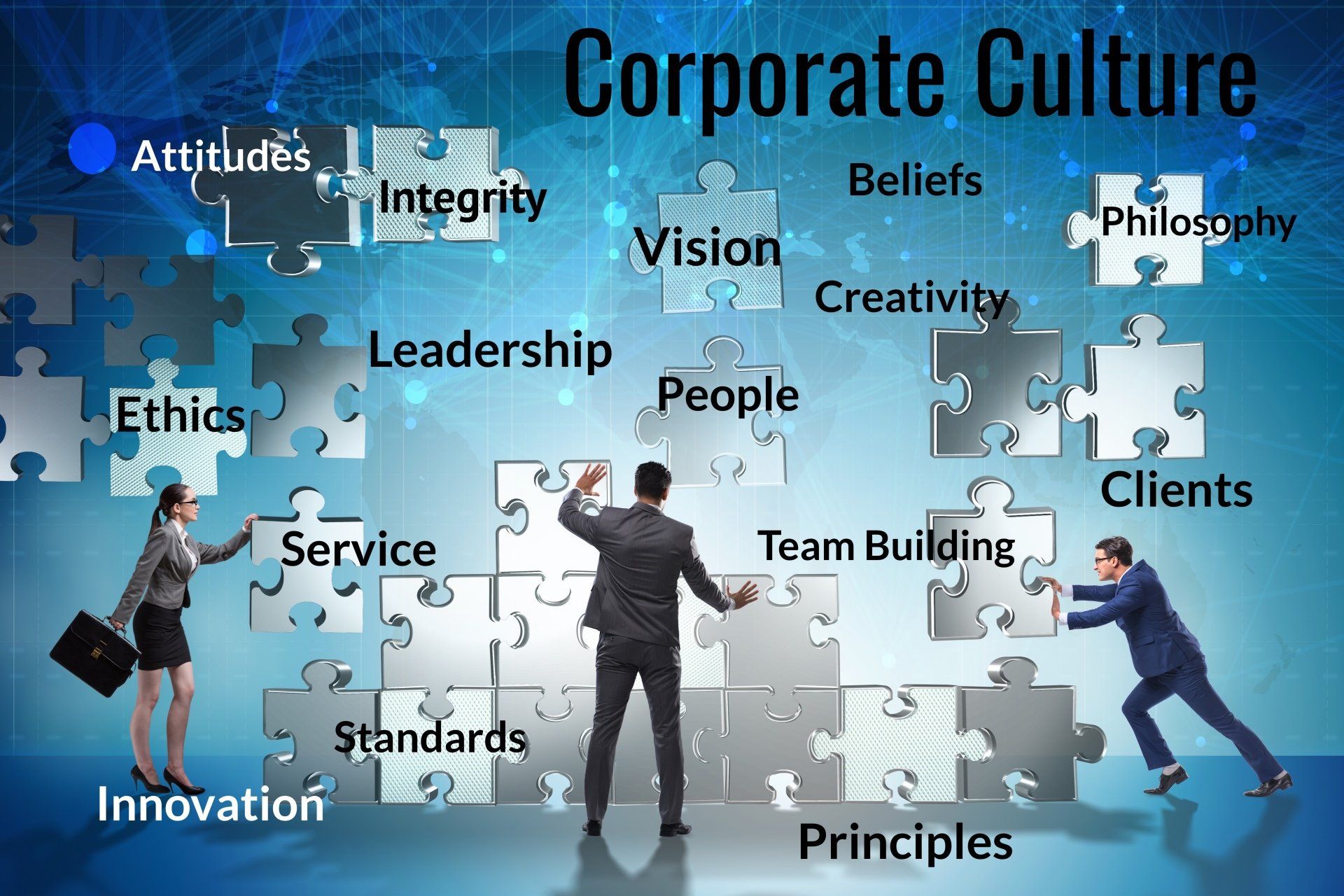KLH Growth Strategies Blog

“Culture eats strategy for breakfast.” - Peter Drucker
This is one of the coolest quotes in business history. I’ll go a step further - corporate culture totally defines an organization and everything it stands for. Culture determines the success or failure of a business.
But what is corporate culture ? And just to stir things up even more, what are values ?
These are terms that are thrown around a lot, to the point where they are almost cliches - at the very least, they are generalities. And like all generalities, culture and values can mean a million different things to a million different people. I viewed 13 videos, looked up 14 definitions, and read 33 articles, all on corporate culture - and each one has differences!
Sure, we all have some general idea of what is meant by culture and values. But, if corporate culture - and values - is so important, shouldn’t we have a much more precise and complete definition?
Here’s a definition with a lot of good points, from inc.com :
Corporate culture refers to the shared values, attitudes, standards, and beliefs that characterize members of an organization and define its nature. Corporate culture is rooted in an organization's goals, strategies, structure, and approaches to labor, customers, investors, and the greater community. As such, it is an essential component in any business's ultimate success or failure. Closely related concepts, discussed elsewhere in this volume, are corporate ethics and corporate image (which is the public perception of the corporate culture). The concept is somewhat complex, abstract, and difficult to grasp.
“The concept is somewhat complex, abstract and difficult to grasp” because there are too may un-defined terms such as values, attitudes, standards and beliefs in the definition. Everyone has his or her own definitions of these terms. That’s why corporate culture has been complex and difficult to grasp - no one is on the exact same page.
But to be fair, this is a very good starting point for defining corporate culture. If those 4 terms were better defined, this would be an excellent definition.
Here’s another promising definition from whatis.techtarget: ( https://whatis.techtarget.com/definition/corporate-culture )
Corporate culture is the pervasive values, beliefs and attitudes that characterize a company and guide its practices. To some extent, a company's internal culture may be articulated in its mission statement or vision statement. Elements of corporate culture include a company's physical environment, human resources practices and the staff itself. Corporate culture is also reflected in the degree of emphasis placed on various defining elements such as hierarchy, process, innovation, collaboration, competition, community involvement and social engagement.
There’s that word values again! What values? Where’s the approved list?
Even using values without defining what those values are, these 2 definitions above combine to give an excellent foundation for better defining corporate culture.
Taking the best elements of all the articles, courses and video I've studied, and adding a few items of my own, let me offer this definition:
Corporate culture is the combined total of the core philosophy, purpose, attitudes, principles and set of beliefs of what the organization stands for, what it intends to accomplish, and how it is operated, structured and managed. Corporate culture is set primarily by the leaders of the organization. Culture defines the very nature, character, intentions, actions and behavior of the organization as a whole and greatly influences how individual team members operate and interact.
Those core beliefs, philosophy, purpose, attitudes and principles (1) determine how the organization’s people are chosen, developed and managed, (2) drive how business is done, (3) decide the standards the organization operates on, (4) define the core values of the organization, and (5) determine the level of commitment, quality, communication and service toward clients and customers.
The overall core philosophy, principles, attitudes and beliefs consist of these specific interacting elements:
1. Purpose and Vision
- Why is the organization there?
- What need or desire does it satisfy for people?
- Does it improve people’s quality of life, and how?
- What does the organization intend to accomplish?
2. Philosophy and Principles About Its People and Clients/Customers
- Defines the character and qualities of people hired for the business
- Defines attitudes toward and about team members (trust, beliefs, expectations)
- Attitudes toward and about customers and clients
- Beliefs regarding the potentials, capabilities and growth of the organization’s people
- Attitude toward developing personnel and team building
- Attitude as to how much or how little staff are allowed to be creative and contribute to the success of the business
- Expectations of responsibility and accountability
- Rewards System - financial, professional, promotions, validations, awards, bonuses
- Philosophy about Client/Customer service and care, and delivery of products and services
3. Leadership
- Leadership qualities
- Setting goals
- Strategy and planning
- Management systems, styles and processes
- Company structure and flows
- Degree and quality of communication - internally within the company and externally with clients and customers
- Professionalism, degree of
- The general mood and tone in the business
4. Core Values
- integrity (how high or low)
- ethics (high or low)
- quality standards (high or low)
- intention to do the right things (or not)
- fairness, degree of
- helping others, degree of
- innovation, attention on
- commitment to be the best (or not)
- continuous improvement (or not)
- care for the well-being of personnel, degree of
- delivering excellent value to clients/customers (how well)
- resolving client/customer problems and upsets quickly and fairly (how well)
- improving the quality of life of clients/customers (how much)
5. Standards
- Standards set for customer service and care
- Standards for the quality of products and services delivered to clients
- Standards and expectations set for each job
- Standards for quality in every part of the organization
- Standards set for behavior in the business, codes of conduct
6. Policies and Procedures
- Company rules and regulations
- Disciplinary policies and procedures
- Codes of conduct
There’s a lot to this definition! Of course, there has to be, because an organization is a complex, living organism consisting of people and lots of moving parts. (And you'll notice I made an attempt to list specific values. I really dislike generalities, buzzwords and cliches.)
If corporate culture is so important and defines the very nature, character and behavior of an organization, then a detailed description and definition is called for.
This definition could even serve as a useful checklist. A business can work out the answers, definitions and descriptions of all those points. A business could create or transform its very culture from this checklist.
I wanted a complete definition, one that covers all aspects of what culture really means in an organization. All the factors and elements in this definition combine to determine how things are done, how business is conducted, how people interact, how the company thinks about and acts toward clients and customers.
Take a rope, as an analogy. Individual strands are inter-twined with each other, forming one rope. A rope’s strength comes from (1) the number of strands and (2) how well the strands are woven together.
Now imagine all of the individual elements in the definition of corporate culture as individual strands in a rope. Like the strands of a rope, many individual elements form one corporate culture. How high and how well those elements are applied - and how well those elements are woven together, how well the organization is structured and managed - determine the strength of the business.
A word about strategy, since that was included in Peter Drucker’s cool quote. Strategy is the master plan of how a business will reach its goals. Strategy addresses such elements as defining the goals, how to hire and develop the right people, how to organize the group for maximum efficiency and productivity, the marketing plan, sales plan and training, how to produce and deliver the best product and service to clients, how to rise above the competition, the management and leadership systems and processes.
A good strategy is vital to a business’s success. Without a good strategy and plan, any business will struggle and most likely fail - even a business with an otherwise good culture.
However, even given this need for good strategy and planning, corporate culture still ranks above strategy in importance. All the greatest strategy ever devised won’t be successful if the culture isn’t high enough.
So the hierarchy of importance goes like this:
_____________
Other Articles by the Author
15 Core Qualities of Exceptional Leaders
The Awesome Power of the 5 Fundamentals
9 Steps to Hire Your Ideal People
What We Can Learn from an Orchestra Leader
How I Went From Sales Failure to Closing 94% of Clients
The 13 Ingredients to Business Success
An Amazing Story of the Human Spirit

A simple yet powerful definition of an exceptional leader is
a purpose-driven individual who inspires others to be the very best they can be while pursuing a worthy purpose
All great leaders throughout history - be they heads of empires or nations, religious leaders, revolutionaries, business leaders, discoverers - have been able to cause, inspire, and motivate other people to follow them toward a given purpose and goal, and grow and develop people as well.
How does one become an exceptional leader so as to inspire and motivate people to follow and work toward the leader’s goals and purposes? Here are the 15 core and fundamental qualities of an exceptional leader.
A strong, clear purpose and vision
Purpose is perhaps the most powerful force in the universe. Throughout history, people have accomplished amazing things and created fantastic results through the sheer power of purpose and purpose alone. Every major advancement in society, every advance in every civilization, every discovery, every revolution, every great religious or political movement, every invention and technological advancement, all philosophies are the result of one thing and one thing only - the purposes of individuals. People respond positively to a constructive and strong purpose.
High integrity
Integrity is defined as the state of being whole and undivided; the condition of being unified, unimpaired, or sound; lacking corruption; the quality of being honest and ethical . A true leader has high integrity, and stays true to his or her purpose. A true leader interacts with other people with high integrity and truthfulness, and doesn’t play games with his or her people.
Courage and persistence
It takes courage to be an effective leader. Life, society, competition, other people’s intentions, government policies all combine to present a formidable set of barriers to accomplishing one’s goals and purposes. There are plenty of barriers that get in the way of accomplishing goals, and it takes courage to face these barriers and overcome them. It takes persistence toward a purpose and goal, a never-give-up attitude, a willingness to keep moving forward no matter what barriers are in the way and how many setbacks an individual or group has had. In addition, a true leader isn't concerned about what other people think of him or her. The exceptional leader focuses on achieving the purpose.
Expertise and high competence
A leader who is a true expert in his or her field, and who demonstrates high competence and knowledge, is respected and admired for that one quality alone. Knowing all about a profession or field gives a leader a certain elevation and stature with his or her people. People will usually follow a true expert just because he or she knows so much about the profession and is so competent at all the jobs related to that profession.
Ability to communicate very well
A leader who communicates the goals and purposes clearly and completely will motivate and inspire his or her people to work toward those same goals and purposes. Leaders learn how to communicate in such a way that their people fully understand the goals and the plans to achieve those goals, understand how their jobs contribute to those purposes and goals, and understand what is expected of them.
Exceptional leaders also make sure their people are fully acknowledged and given credit for their help, contributions and successes.
Understanding his or her people's points of view
Exceptional leaders communicate with their people so as to learn and understand their points of view, their realities, their struggles, their strengths and weaknesses, etc. Great leaders work to understand their people for positive and constructive reasons, and then work to guide them in the right direction, guide them through any difficulties, and help them grow and develop. Understanding others does not mean the leader tolerates negative or counter-productive behavior or actions, or alters course toward the purpose - leaders never lose sight of the purpose. Understanding others allows leaders to provide genuine help, guidance and direction to their people as needed.Willingness to make the hard yet proper decisions for the good of the group.
Willingness to make the hard yet correct decisions for the good of the group
An unwillingness to make hard but necessary decisions causes the entire group to suffer. An executive who cannot take the right action for fear that he or she will be thought less of by others, is a weak and failing executive. The exceptional leader does not try to please everyone. Trying to please everyone is a sure road to failure. Instead, the effective leader works for the good of the entire organization as this in turn will generate the most success, job satisfaction, and professional rewards for his or her people.
Inviting and accepting other peoples' cooperation, ideas and contributions
Most people are good, constructive and caring, and want to do a good jobs. Good people want their groups to succeed. Good people respond well to the truth, they respond well to positive direction and coordination. Such people respond especially well to requests and invitations to help and contribute. What is most remarkable about such people is how well they rise to any occasion, if they are simply asked and encouraged to do so. Good people are an organization’s greatest asset, so why not utilize them to the fullest?
Encouraging people to be their very best
The best leaders create a positive environment which encourages people to develop and become the very best they can be. Exceptional leaders invite and inspire their people to come up with good ideas and develop better ways of doing things. Such leaders provide an atmosphere of creativity and challenge that brings out the very best in people. Exceptional leaders make sure all people in the group receive any needed training and knowledge.
Concentrate on people’s positives more than their negatives
Good people have far more positives than negatives. So more attention should be placed on the positives. Exceptional leaders reinforce and strengthen the positives in people, and keep a lid on their negatives. Exceptional leaders recognize the true value in all their people, and encourage their people to grow and enhance their skills and abilities.
Ability to get things done
Exceptional leaders have the ability to get things done. This goes along with expertise and competence in one’s field. The leader who is personally a strong producer and who gets good results consistently, who knows his or her business and exercises good judgment is automatically respected by others. People will tend to follow someone who can get the job done himself or herself, someone who is a proven winner and success.
Motivating Others to Get Things Done
While it’s true and ideal that a leader be an expert in his or her field, it’s equally important that a manager know his or her duties and responsibilities as an executive and leader. One of the major roles of a leader is to get his or her people to do their jobs well, to the highest standard and performance. This includes making sure that his or her people receive the most effective training that develops them to their fullest potentials. The end result of all a leader's work is a productive, efficient, high-morale, low-stress team of competent professionals that is united, motivated and working as a coordinated, efficient team dedicated to accomplishing its goals.
Diligence and Vigilance
It is remarkable how many organizations encounter problems, decreased sales or revenues, declining stock values, loss of market share, loss of influence, loss of power, failure to reach goals - all due to simply a lack of diligence and vigilance on the part of top management.
The definition of diligence is conscientiousness in paying proper attention to a task; giving the degree of care required in a given situation; persevering determination to perform a task .
The definition of vigilance is carefully observant and attentive; carefully noticing problems or signs of danger, alertly watching and monitoring, especially to avoid danger.
The exceptional leader is constantly diligent and vigilant in applying the fundamental principles and successful actions in his or her organization, and seeing to it that these are carried out by all people at all times. The exceptional leader also recognizes danger signs and takes the correct and appropriate action; he or she doesn’t ignore or brush off such signs.
The Optimum Balance of Flexibility and Decisiveness
The exceptional leader is flexible and secure enough to invite the help, cooperation, contributions, and ideas of his or her people, and then implement these as appropriate. As already stated above, most people are good, constructive and capable, and most people want to do a good job. It takes some courage and confidence to allow one’s people to contribute their ideas, imaginations, abilities and judgment, and to give people enough discretion and latitude to grow and help the business grow.
At the same time, an effective leader is also decisive. At some point, a good leader makes decisions after he or she has briefed the staff and gotten all their observations and ideas, and has analyzed and evaluated the situation and ideas. Once the leader is certain as to the correct course of action, he or she makes that decision and carries it out. Exceptional leaders don’t allow themselves to be negatively influenced or distracted off course. They can always change course if the situation changes or if they get new and relevant information that demands a change in plans. But a leader ultimately must make decisions and carry them out to their desired end results.
In this way, the exceptional leader is the perfect blend of flexibility and decisiveness.
Give Positive Direction and Coordination
A good leader issues only positive directions, all leading toward the goals and which do the most to keep people focused on reaching the intended goals and purposes. The exceptional leader coordinates people and resources in the most efficient and productive manner possible. Exceptional leaders never lose their cool. They never belittle, demean or in any other way bring down any member of their team. Good leaders are never harsh, loud, arrogant, sarcastic or any other negative attitude or emotion. Directives are issued with positiveness, with confidence, with understanding, with a positive attitude and with patience.
Don’t jump to conclusions
Great leaders never fly off the handle based on one report or one person’s story. The exceptional leader doesn’t assume that what he or she hears the first time is true; exceptional leaders verify the facts and truth before taking any disciplinary action. 98% of all mistakes, false information, dropped balls and incorrect actions are the result of some misunderstanding, one way or another. Only 2% of screw ups or false information are intentional.

